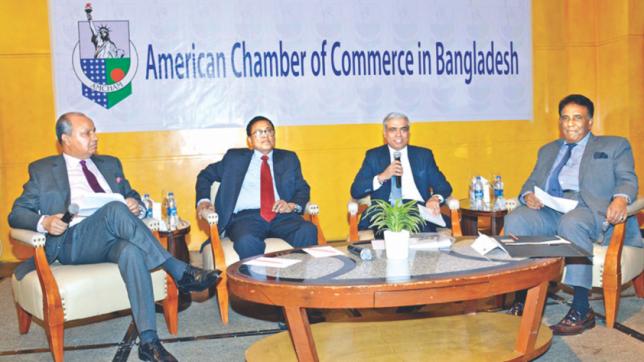BB has been made weaker, its director says

The central bank's role as the custodian of the production and distribution of money and credit in the economy has been eroded over time by the finance ministry, said a director of the Bangladesh Bank yesterday.
“It has become an extension of the ministry of finance,” said Aftab ul Islam, a director of the BB, at the monthly luncheon meeting of the American Chamber of Commerce in Bangladesh (AmCham) at The Westin hotel in Dhaka.
The finance ministry often forwards proposals for loan scheduling or for rescheduling for the fourth or fifth time.
“Sometimes, the central bank governor or the central bank board is undone either directly by the ministry of finance or the head of the government.”
Subsequently, the financial health of banks has become “horrendously bad”. “Bangladesh's all indicators are wonderful except the financial health. Financial health is really, really very bad.”
He went on to call for soul-searching to fix the situation, said Islam, a former president of AmCham.
But, there is a good chance to recover the money as the big borrowers are coming forward to clear their loans to get a Credit Information Bureau report to contest in the general election.
Due to the antiquated nature of the education system, the country has been suffering from a dearth of efficient managers, he added.
In gender parity Bangladesh has done the best in Asia and not just South Asia, said Manmohan Parkash, country director of the Asian Development Bank.
“Achieving seven percent growth is remarkable,” he said, while stressing on the importance of political stability and public policy consistency.
Regarding the traditional education system, he said the country has only one quality university for engineering and architecture: the Bangladesh University of Engineering and Technology.
“You need to really invest in technical education. I must tell you it is the technical education which really builds the country.”
For instance, in China all the top leaders have a technical academic background, Parkash said. “The education system which is now in operation is no longer valid.”
To further his point he cited the case in the US, where three companies including Ford and Volkswagen used to employ 21 million people.
But today, Facebook, Google and Apple, whose combined turnover is in trillions of dollars, employ just 154,000 people.
“The jobs you knew yesterday will not exist tomorrow. So if you are investing in the same education system, I am sorry that's not the futurists,” he said. In fact, the garment industry will also witness a lot of change due to technological advancements like robotics and automation.
“So, it is better to embrace the changes and think where to invest. There, I agree entrepreneurship is the way to go. You really need the youngsters who have a lot of fire, who have a lot of hunger.”
Bangladesh receives $15 billion as remittance, which is only $200 on average per person, he said. If the money is sent through the official channel, banks keep 15 to 18 percent of the amount.
“If you go to the blockchain, you need to pay six cents for receiving a billion US dollar. That's the way to go. Let's not think in conventional way, let's think out of box. The young people can change the things,” Parkash added.
Time has come to think which yields more benefits for the country: making one taka deficit in the budget or investing one taka in the private sector, said Mohammad Tareque, director of the Bangladesh Institute of Governance and Management.
Md. Nurul Islam, AmCham president, moderated the discussion.
